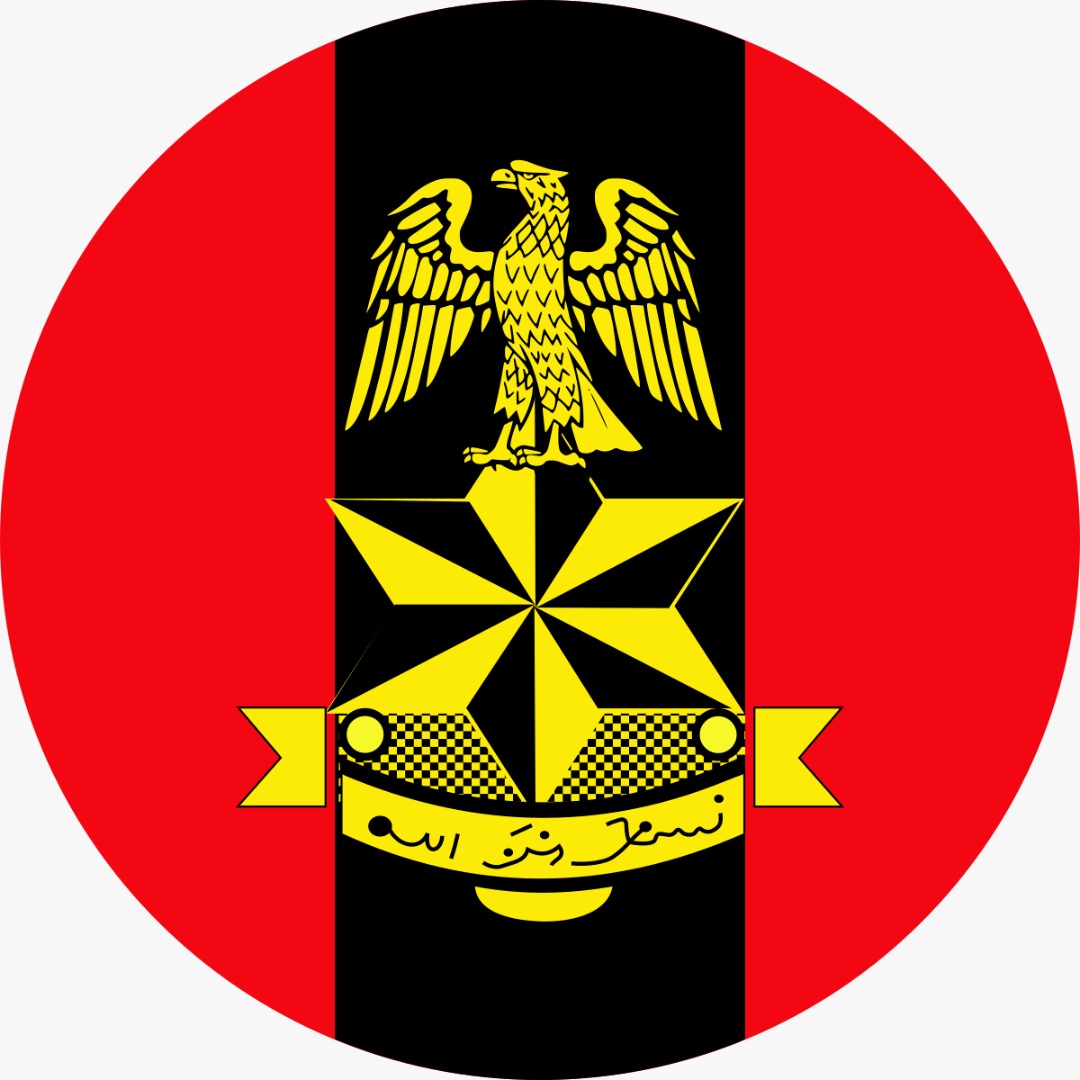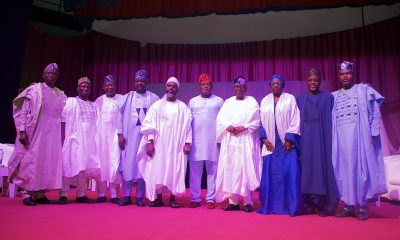society
2022: CELEBRATING THE ARMED FORCES OF NIGERIA AMID SECURITY CHALLENGES

2022: CELEBRATING THE ARMED FORCES OF NIGERIA AMID SECURITY CHALLENGES
By
Brigadier General Sani Kukasheka Usman (rtd) mni fnipr
The 15th of January every year has always been the day the Nigerian Government and people celebrate the Armed Forces of Nigeria (AFN). The day marks the climax of almost two months of activities which always starts with the launch of the Armed Forces Remembrance Day Emblem and Appeal Fund in the preceding November, by the President, Commander-in-Chief of the Armed Forces of the Federal Republic of Nigeria. The remembrance emblem which was like the Remembrance Day poppy worn in other countries such as the United Kingdom.
These activities are replicated across the 36 States of the Federation and the Federal Capital Territory and are conducted in conjunction with the Ministry of Defence, the Defence Headquarters, Services, and the Nigerian Legion. A visible element of all these is the sale of the Remembrance Emblems across the federation as part of the fund raising. This annual event is a mark of honour, respect, solidarity and appreciation of the importance and sacrifices of members of the AFN.
Millions of people buy the remembrance emblem and adorn their dresses with it, usually worn on the top left-hand side of their attires, close to the position of the heart, symbolizing deep concern for the fallen heroes and veterans. The adornment lasts until the 15th of January after the Wreath-laying Ceremony Day. It is curious to see some people wearing it long afterwards, either out of ignorance or love for decorations and the Armed Forces. Depending on the organisers or mood of the nation, major activities associated with the Armed Forces and Remembrance Day Celebration, include book launch and symposiums on national unity, the importance and role of the military and include special prayers in places of worship.
Depending on which of the days come first between Friday and Sunday before the 15th of January, both the Christians and Muslims faithful hold special prayers in the form of interdenominational service in all military churches and special Jumma’at prayer on Friday at various mosques across military barracks and cantonments. At the Federal Capital Territory, the Special Jumma’at prayers often take place at the National Mosque, while Church Service is conducted at the National Christian Centre.
The special prayers are followed by well laid out colourful activities on the 15th of January as the climax to the Armed Forces Remembrance Day Celebration. In Abuja, the activities include inspection of a static parade by the President, Commander-in-Chief of the Armed Forces of Federal Republic of Nigeria. The parade is mounted by AFN and the Nigerian Legion at the National Arcade, opposite Eagle Square, Three Arms Zone, Abuja.
The parade activities include Wreath-Laying Ceremony at which the President, Vice President and other top government functionaries including the Senate President, Speaker of the House of Representatives, Chief Justice of the Federation, Ministers of Defence and that of Federal Capital Territory, all lay Wreaths in front to the statue of the Unknown Soldier. From the Armed Forces, the Chief of Defence Staff and Service Chiefs lay Wreaths. Others are the Inspector-General of Police, National Chairman of Nigerian Legion, the Doyen of Diplomatic Corps, and a representative of the widows of our celebrated fallen heroes. Wreath Laying is done in a solemn mood and participants towards the Wreath Laying spot in slow march.
The Chaplains and the Imams offer prayers while the detachment of the Artillery Corps of Guards Brigade of the Nigerian Army release volleys shots from their weapons in honour of the fallen heroes. The President also releases white pigeons from a special cage placed within the Remembrance Arcade, before signing a special register at the Arcade. The wreath-laying ceremony is often very nostalgic and emotional for serving and retired military personnel and their family members, especially those of the deceased members of the AFN. Therefore, it is a momentous event.
The activities of this day are also replicated at the States level with varying sequences of actions and personalities laying the wreath at the tomb of the Unknown Soldier or the Remembrance Arcade. However, the sequence and mode of these activities have been affected by current realities occasioned by security challenges and the COVID-19 pandemic with its ever-evolving dangerous variants. Consequently, the tradition is often tampered with hence it may not take the usual standard order.
The Armed Forces and Remembrance Day Celebration dates back to 1919 when the British Commonwealth member states used the day to mark the end of the First World War and honour the memory of those who died during the War. On gaining independence and republican status, the day was changed to honour the veterans of the First and Second World Wars as well as those of the Nigerian Civil War solemnly but grandly. It was then called Armed Forces Remembrance Day and was celebrated on the 11th of November every year. However, with the end of the Nigerian Civil War in 1970, Nigeria decided to adopt the 15th of January every year to commemorate and honour her Armed Forces and fallen heroes, with additional emphasis on those living and serving.
Keeping a day aside to celebrate the Armed Forces by nations is a worldwide phenomenon and a commendable gesture that recognizes the importance of the military in national development and their increasing role in the quest for peace and security. The day and the activities around it boosts troops’ morale, gives them hope and greater sense of belonging. Therefore, the recognition and honour are rightly deserved, especially given the increasing role of AFN in internal security operations, with troops deployed in over 34 States of the federation and the Federal Capital Territory. Despite these routines and rituals, the Armed Forces Remembrance Day Celebration should be an occasion for sober reflection and critical appraisal of the AFN in the drive to make it more professional, responsive, effective, and better to meet up with the yearnings and aspirations of Nigerian citizens in these contemporary trying times. As an individual who served and voluntarily retired from the service about three years ago, I regard this important and critical institution, as a symbol of national power as the required instigator for our national development.
The AFN has been noted worldwide as one of the most courageous, loyal, and professional military with a history of successful battles, exploits and military campaigns during the First and Second World Wars. It’s gallant contribution to world peace and security through Peace Support and Enforcement operations under the auspices of the United Nations, the erstwhile Organization of African Unity (now African Union) and the Economic Community of West African States (ECOWAS) from the 1960s to date, which are unquantifiable. There is no gainsaying therefore that the AFN has been a stabilizing factor for our national unity, and it is the vanguard of democratic governance, especially since 1999.
Undoubtedly, the AFN of Nigeria has not fared badly over the years, even in the prevailing circumstances in the country. They are in the vanguard of the fight against terrorism, kidnapping, banditry, and other security challenges. Yet, despite all these sacrifices, the level of understanding and appreciation of the AFN is not commensurate with the tremendous role it is playing, and daily sacrifices. Over the years, the AFN and indeed the nation, have lost so many gallant officers, soldiers, ratings, airmen and women, as well as, many equipment in the course of national duty.
Many have been injured, losing limbs, sight, and other parts of the body. The Army, in particular, lost its then Chief, Lieutenant General Ibrahim Attahiru, along with other senior army officers and his personal staff on Friday 21 May 2021 in a plane crash that occurred at Kaduna while on an official duty. The unfortunate incident occurred barely four months after he was appointed Chief of Army Staff. All these are irreparable and indelible loses to the nation and humanity.
Beyond that, the various Services under their able and respective Chiefs have been discharging their duties creditably. The renewed jointness and synergy of efforts amongst the Services and other security agencies under the strategic direction of the Chief of Defence Staff, General Lucky Irabor, is indeed commendable.
The renewed synergy of efforts coupled with the launching of newly acquired military weaponry and equipment such as drones, the Super Tucano, Mine Resistant Anti-Ambush Protective Vehicles and Armoured Personnel Carriers by the Nigerian Army and the Nigerian Air Force and the reclaiming of parts of Lake Chad by the Nigerian Navy and the current wave of operations in the Northwest geo-political zone are gradually yielding results. While there is a need to do more, kudos be given to the military who needs to be celebrated as obtainable in other parts of the world.
However, despite the various achievements, efforts, and sacrifices by the gallant AFN, some pessimists have not seen the reason for the remembrance and celebration. The reluctance on the part of some these Nigerians to appreciate and celebrate the AFN and the veterans, stemmed from a lack of understanding of the AFN, its role, and the conduct of a few misfits in the system. This calls for more enlightenment for Nigerians to understand the unique nature of military service, which involves being patriotic, requires able-bodied men and women, to be absolute loyal and dedicated to duty. It should be noted that the Service comprises of Nigerians who voluntarily enlisted to defend the territorial integrity of the nation, making personal and group sacrifices to the extent of losing their lives for the comfort, well-being, safety, and security of others. We, therefore, need to support and encourage them as they continue to discharge their duties creditably, dispassionately, and professionally.
Therefore, Nigerians have every reason to celebrate their Armed Forces based on these accomplishments and for the sake of boosting their morale.
On their part, members of the AFN should also understand that Nigerians expect a lot from them, and their line of duty and purpose is a matter of trust. Whatever they have and hold, in terms of equipment, weapons and platforms are in trust for the Nigerian people and should be used bearing that in mind. The AFN must remain apolitical and professional men and women devoid of any extraneous variables.
There is no doubt that the AFN is overstretched, given their deployment in internal security operations and other policing duties in different parts of the country. The AFN have collectively gone beyond their statutory responsibilities of defending the nation to undertaking numerous internal operations and humanitarian activities in aid of civil authority and to needy Nigerian communities, all in the efforts to maintain peace and security in support of democratic governance in our country. This is something to be cherished, proud of and proudly celebrated.
Nigerians need to support and appreciate the AFN, possibly by providing information which will assist in their operations and by identifying with the Remembrance Day Celebration activities through the purchase and adorning the remembrance emblems from the month of November to 15th January. The government needs to do more in shoring up the capacity and the capability of the AFN, by kitting, equipping and increasing the human resource holding. The other security agencies must be given similar treatment. The budgetary allocation of the military and other security agencies must be proportionate to the existential threats facing the nation. This will allow them perform their assigned roles and provide security for the nation., thereby creating an enabling environment for development.
The Armed Forces and Remembrance Day Celebration is for both for the dead and the living. Consequently, there is also the need to review the welfare packages of the military to ensure that they live, move and fight in comfort. The severance packages and entitlements to the families of the deceased need to be reviewed and paid as at when due. In particular, the government needs to fund and pay all outstanding group life insurance and other entitlements owed to the families of our fallen heroes. The Federal Government should, as a matter of urgency, streamline the payment process and harmonize the lingering animosity between the Ministry of Defence and Defence Headquarters as regards the administration and welfare of veterans and deceased heroes’ families. A situation where our veterans’ resort to protest on account of non-payment of entitlements reminiscence of the terrible years gone by should not be allowed to repeat itself.
Therefore, Nigerians should know that the AFN is theirs and whatever affects the AFN has corresponding multiplier consequences on our national security and unity. Thus, the unnecessary distraction and campaign of calumny against the leadership and the AFN are generally not in this nation’s best interest. It is time for Nigerians to come together and support the AFN to succeed in their assigned constitutional responsibility, especially now that we are celebrating them.
Indeed, the AFN has continued to move to greater heights, discharging its constitutional roles, despite the apparent distractions and protracted security challenges, with meagre resources. They need our collective support and understanding, let their efforts and sacrifices not to be in vain. May the gentle souls of our departed heroes continue to rest in peace. Consequently, I join millions of other Nigerians to celebrate the AFN, now and always, wishing our gallant troops, wherever they might be deployed, a happy and prosperous 2022!
The writer, Sani Usman Kukasheka, mni, voluntarily retired from the Nigerian Army in February 2019 as Director of Army Public Relations and Spokesman for the Nigerian Army at the rank of a Brigadier General.
news
Journalists for Good Governance Shines Searchlight on Local Government Administration

Journalists for Good Governance Shines Searchlight on Local Government Administration
…Calls for Accountability in Nigeria’s Grassroots Governance
LAGOS, Nigeria — A civil society coalition known as Journalists for Good Governance(JGG) has intensified public debate on transparency and accountability within Nigeria’s local government system, urging media professionals, civil society actors, and citizens to hold grassroots leaders accountable.
Speaking an event in Lagos recently, the acting chairman of the society, Comrade Bunmi Obarotimi said that despite reforms such as the Supreme Court’s 2024 ruling granting financial autonomy to all 774 Local Government Areas (LGAs), systemic challenges continues to hinder effective service delivery and responsible stewardship of public funds.
“Local governments are the closest tier of government to the people — yet too often they remain the least transparent. Without civic oversight and vibrant media, promises of autonomy ring hollow.” the acting chairman said.
The Journalist for Good Governance emphasised crucial roles that journalists can play in uncovering discrepancies in council spending, flagging poor service delivery, and educating citizens on their rights. Their call comes amid wider efforts by media and civic organisations to bridge accountability gaps. The civil society initiatives had previously launched monitoring campaigns to track local government expenditures and have been quietly advocating for transparency in how public money is deployed.
The leaders of the Journalists for Good Governance (JGG) highlighted the importance of physical assessment and citizens engagement on projects to boost people’s confidence, urging local councils to adopt open data platforms and proactive information dissemination in compliance with the Freedom of Information Act. Experts say the majority of LGAs currently lack operational websites or digital portals, further limiting public scrutiny.
The Journalists for Good Governance initiative aligns with sustained advocacy by civil society groups and governance experts calling for a collective approach to strengthening democratic accountability, and has decided to engage in critical and holistic assessments of how Local Governments is being run and the impact and quality of projects they embark-on and to address deficits in transparency and public trust.
Meanwhile, some state governments have signalled support for improved community engagement. In Lagos State, authorities reiterated a commitment to enhancing community media platforms as vehicles for civic participation and accountability at the grassroots level.
The renewed spotlight on local government administration has reignited public debate over fiscal responsibility and priorities. Controversies such as the widely criticised Adamawa council chairmen’s wives trip to Istanbul — which drew public outrage for perceived misuse of public funds — underscore why watchdog groups say stronger oversight mechanisms are urgently needed at the grassroots.
Citizens and activists have welcomed the journalists’ initiative, calling for sustained media engagement that goes beyond headlines to influence policy and accountability reform.
The civic rights advocates note that real change will require robust legal frameworks, a free press, and empowered communities equipped to demand transparency at every level of governance.
As Journalists for Good Governance mobilises its members, the coming months are likely to see heightened media attention on grassroots administration — from council budgets and service delivery to the enforcement of public information laws and digital transparency initiatives.
society
Good Politics Or Just Power? Two Years After The Elections

Good Politics Or Just Power? Two Years After The Elections
Two years after the last general election, Nigerians are justified in asking a direct question: is our democracy stronger today than it was then? Democracy is not measured by how many offices a party controls or how loudly politicians speak. It is measured by integrity, accountability, and the lived experience of the people. Good Politics demands more than victory at the polls; it demands moral leadership and visible progress in the lives of citizens.
The debate over amendments to the Electoral Act should have provided an opportunity to deepen transparency and strengthen public confidence. Instead, hesitation to fully embrace reforms that safeguard credible vote transmission and accountability has fueled doubt. In a nation where electoral credibility remains fragile, any reluctance to reinforce safeguards sends the wrong signal. Good Politics stands firmly for processes that are open, fair, and beyond suspicion.
The party in power commands significant authority across the federation. With control of the presidency, many state governments, a strong presence in the National Assembly, and influence at local levels, there should be no anxiety about reforms that ensure free and fair elections. Confidence in leadership is demonstrated not by dominance, but by a willingness to subject power to scrutiny. Politics rooted in the omoluabi ethos embraces fairness, transparency, and responsibility, even when inconvenient.
This is the standard long associated with Awolowo, whose politics emphasized discipline, social welfare, education, and institutional strength. His vision was not merely about holding office, but about transforming society through principled governance. Good Politics follows that tradition. It rejects manipulation, arrogance, and the concentration of power without accountability. It insists that authority must serve the people, not itself.
Beyond electoral reforms, democracy must deliver tangible relief. Across the country, households struggle with rising prices and shrinking purchasing power. Small businesses are burdened by escalating costs. Young people search for opportunities that remain scarce. When economic hardship deepens, democracy feels abstract. Good Politics recognizes that political legitimacy is reinforced when citizens can see and feel the benefits of governance.
The concentration of power within a single political structure should translate into coordinated reform and measurable development. When it does not, questions naturally arise. Democracy weakens when dominance replaces performance. It weakens when loyalty to party eclipses loyalty to principle. The omoluabi tradition teaches that character defines leadership. Without character, authority becomes hollow.
A healthy democracy requires credible elections and compassionate governance. It requires leaders who understand that politics is a moral enterprise. Two years into this administration, many Nigerians remain uncertain about the direction of both our democratic processes and their daily welfare. If democracy is to endure, it must reflect Good Politics: fairness in competition, integrity in conduct, and compassion in governance. Anything less falls short of the standard that our history and our values demand.
news
GEN CHRISTOPHER GWABIN MUSA SUPPORT INITIATIVE COMMENDS STATE-FEDERAL COLLABORATION IN ZAMFARA

GEN CHRISTOPHER GWABIN MUSA SUPPORT INITIATIVE COMMENDS STATE-FEDERAL COLLABORATION IN ZAMFARA
The Gen Christopher Gwabin Musa Support Initiative (GCGMSI) has commended the Zamfara State Government for its decisive contribution to security operations through the donation of newly acquired armoured personnel carriers (APCs), surveillance drones, and other critical operational equipment to troops and security agencies in the state.
This commendation was contained in a statement signed by the Convener of the GCGMSI, Ibrahim Dahiru Danfulani, Sadaukin Garkuwan Keffi/Betara Biu, and made available to the press.
The equipment was formally commissioned on Wednesday, February 18, by the Grand Patron of the GCGMSI and Minister of Defence, General Christopher Gwabin Musa, OFR (rtd.), in a ceremony at the Government House, Gusau. The event was attended by senior military officers, heads of security agencies, and top officials of the Zamfara State Government.
The GCGMSI, in its statement, hailed the donation as a “transformative and timely intervention” that aligns perfectly with its core objective of advocating for and supporting tangible measures that enhance the operational capacity and welfare of Nigeria’s security forces. The Initiative praised Governor Dauda Lawal’s administration for moving beyond rhetoric to actionable, material support, describing the move as a “blueprint for state-level collaboration in national security.”
“The provision of these assets by the Zamfara State Government is a testament to visionary leadership and a profound commitment to the peace and stability of its people,” the GCGMSI statement read. “It represents the exact kind of synergistic partnership between state and federal authorities that the GCGMSI champions. This initiative will significantly close operational gaps, boost the confidence of our gallant troops, and send a strong message to criminal elements.”
Speaking at the commissioning, General Musa emphasized that sustained collaboration is indispensable in confronting the nation’s evolving security challenges. He specifically commended Governor Lawal for his proactive support.
“Governor Dauda Lawal has demonstrated exemplary leadership and an unwavering dedication to the security of Zamfara State,” the Defence Minister stated. “The provision of these armoured vehicles, surveillance drones, and other operational equipment will undoubtedly boost the morale and operational effectiveness of our troops and other security agencies on the ground. This is a commendable effort that should be emulated by others.”
The newly commissioned assets, which include multiple APCs and advanced surveillance drones, are expected to dramatically enhance the mobility, protection, intelligence-gathering, and rapid response capabilities of security forces, particularly in the state’s remote and difficult terrains where anti-banditry operations are ongoing.
In his remarks, Governor Lawal reiterated his administration’s steadfast commitment to being a reliable partner in the security architecture. He urged security agencies to deploy the new resources responsibly and effectively to safeguard lives and property.
The Federal Government, through the Ministry of Defence, reaffirmed its commitment to continuing and deepening such partnerships with state governments across the nation to strengthen coordination and resource allocation in the collective fight against insecurity.
The GCGMSI concluded its statement by urging other state governments to take a cue from Zamfara’s “bold and pragmatic” approach, affirming that such concrete support is vital for achieving lasting peace and security across Nigeria.
-

 celebrity radar - gossips6 months ago
celebrity radar - gossips6 months agoWhy Babangida’s Hilltop Home Became Nigeria’s Political “Mecca”
-

 society6 months ago
society6 months agoPower is a Loan, Not a Possession: The Sacred Duty of Planting People
-

 society5 months ago
society5 months agoReligion: Africa’s Oldest Weapon of Enslavement and the Forgotten Truth
-

 news6 months ago
news6 months agoTHE APPOINTMENT OF WASIU AYINDE BY THE FEDERAL GOVERNMENT AS AN AMBASSADOR SOUNDS EMBARRASSING









